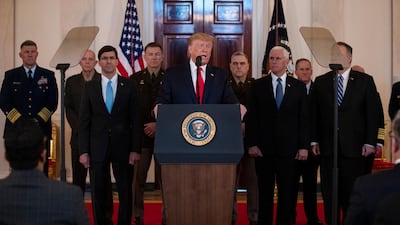Oil retreated back to levels seen prior to the geopolitical stand-off between the US and Iran after Washington indicated de-escalation on Wednesday.
"Iran appears to be standing down, which is a good thing for all parties concerned and a very good thing for the world," President Donald Trump said on Wednesday.
Brent was up 0.3 per cent and trading at $65.65 per barrel at 4.44pm UAE time, while West Texas Intermediate was up 0.7 per cent at $60.01 per barrel.
Brent dropped nearly 4 per cent following Mr Trump's speech on Wednesday as markets priced out geopolitical risks.
"Oil prices sold off more than 4 per cent as concerns about supply risks in the Middle East calmed," said Norbert Rücker, head of economics and next-generation research at Julius Baer.
"The latest actions and reactions show that both opponents, the United States and Iran, are shying away from a military escalation out of fear of its potential economic costs," he added.
The bank maintains a "neutral view" on oil and expects prices to trend lower towards the end of the year. Demand is expected to remain soft cushioned by weak growth, and rising supply from Canada and fields in the North Sea.
Oil surged beyond $70 per barrel during early trading on Monday as the US and Iran threatened military escalation following the assassination of Tehran's top military commander in an attack in Baghdad.
Brent, the benchmark for more than half of the world's oil, climbed to an eight-month high, surpassing levels seen after the September 14 attack on Saudi Aramco's oil facilities, which temporarily took out 5 per cent of global oil supply.
The assassination of Qassem Suleimani, the head of the elite Quds Force within the Islamic Revolutionary Guard Corps, prompted talk of "tough revenge" from Iran, which retaliated by hitting US bases in Iraq on Wednesday.
Markets feared a US retaliation, as Washington had earlier indicated it would target 52 sites in Iran, including some of cultural importance. However, by Tuesday Mr Trump had retracted his words on attacking cultural sites, saying he would abide by the law.
In his address to the nation, Mr Trump said he hoped Iran and the US would "work together on" tackling ISIS as well as other "shared priorities". He also said fresh sanctions would be imposed against Tehran following the latest escalation.
A full-blown conflict in the Middle East that impacts supply through the Strait of Hormuz, through which a third of seaborne global oil supplies transit, would affect "every country in the world", UAE energy minister Suhail Al Mazrouei said on Wednesday.
"The world economy cannot sustain $100 oil prices, he added.


